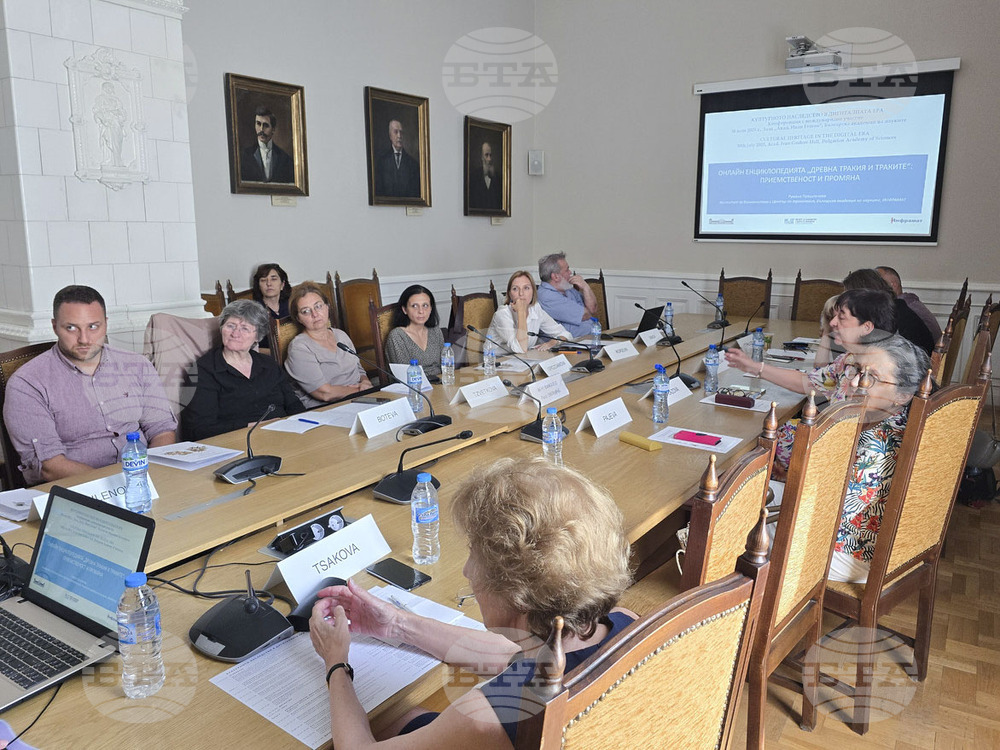site.btaExperts Highlight Role of Digitization in Preserving Cultural Heritage at BAS International Conference


The role of digitization in preserving and promoting cultural heritage was the main focus of an international scientific conference titled "Cultural Heritage in the Digital Age", held on Wednesday at the Bulgarian Academy of Sciences (BAS). Organized by the Prof. Alexander Fol Institute of Balkan Studies with Centre for Thracology (IB&CTh), the event brought together Bulgarian and international researchers, institutions, and representatives of the media sector.
Opening the conference, IB&CTh Director Prof. Roumiana Preshlenova said that over the centuries, cultural heritage has developed and enriched, and today the challenge is its digitization. According to her, the digitization of cultural heritage not only ensures its preservation but also makes it globally accessible, especially benefiting smaller countries like Bulgaria. She noted that this process should align with the priorities of sustainable environmental, social, and informational development. "Today, we would like to emphasize the role of scientists and researchers in this mission. Their participation is not only necessary - it is crucial. With their vision and scientific approach, we can build a future in which cultural heritage is not only preserved but also developed and made accessible to people around the world so that they can explore it, experience it and rediscover the meaning of the past," she added.
BTA Director General Kiril Valchev underscored the responsibility of news agencies in preserving today’s news as tomorrow’s historical memory. He presented BTA’s efforts to safeguard and digitize its extensive archives, which include over 5 million pages of news bulletins, 1.8 million photos, and a subject archive dating back to 1934. The archive is now stored in climate-controlled facilities and a large-scale digitization project launched in 2022 has already converted millions of items to digital format. Valchev identified five key areas of focus: physical preservation, digitization, public accessibility, copyright protection, and international cooperation. He emphasized the need to embrace artificial intelligence as a tool for responsible and efficient news processing and urged that archived and current news be made accessible across all media platforms and in all formats to reach diverse and younger audiences. "Every day, we publish on social media at least one story on that date in history, along with file photos. We've revived LIK, the magazine for culture, art, and literature, which reproduces BTA archive materials on particular topics. Since January 2024, all issues of the magazine since its relaunch in 2022 have been available free of charge in pdf format on the BTA website. Additionally, BTA distributes over 300 print copies of LIK at no charge to libraries, cultural institutions, and universities. The magazine supports digital literacy among the elderly and introduces young people to the cultural heritage of Bulgaria and the world. BTA has also published a book collecting archive news, with one domestic and one international news item for each year since the agency's inception in 1898 until 2023," he added.
Europeana Foundation General Director Harry Verwayen said that cultural heritage must be an inseparable part of Europe’s future. He said that Bulgaria has made progress in digitization but still holds untapped potential. Around 160,000 digital items from Bulgaria are currently available on Europeana’s platform, and more institutions are encouraged to contribute. Verwayen noted the importance of 3D digitization and the responsible use of artificial intelligence in processing and sharing cultural content. He outlined the Europeana Foundation’s work with Creative Commons licensing and its partnerships with educators and researchers.
The conference sessions were dedicated to cultural heritage as an online resource and to the past, present and future of encyclopaedias. Participants in the discussions included Harry Verwayen, General Director of the Europeana Foundation, BTA Director General Kiril Valchev, who presented the digitization of the BTA archives, scientists from the Institute of Balkan Studies with Centre for Thracology, the Institute of Physical Chemistry, the National Archaeological Institute with Museum, and St Kliment Ohridski University of Sofia.
The conference was held in accordance with the National Roadmap for Scientific Infrastructure INFRA MAT, with the financial support of the Ministry of Education and Science.
/PP/
Additional
news.modal.image.header
news.modal.image.text
news.modal.download.header
news.modal.download.text
news.modal.header
news.modal.text















